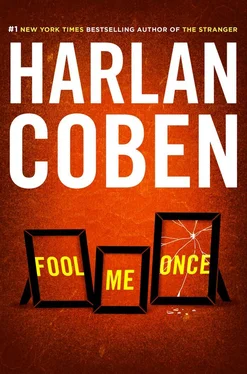“I don’t like that term. I don’t like the connotations—”
She interrupted him. “Can I ask you something?”
“Of course, Maya.”
Spur-of-the-moment decision, but she decided to go with it. Might as well make him useful. “I had something else happen to me. Something connected to all this.”
Wu looked at her and nodded. “Tell me.”
“My friend bought me a nanny cam,” she began.
Again Wu listened without interrupting. She told him the story about seeing Joe on the laptop. Wu managed to keep his face from revealing too much.
“Interesting,” he said when she was done. “This happened during the day, am I correct?”
“Yes.”
“So not at night,” he said more to himself than her. Then again: “Interesting.”
Enough with the interesting. “My question is,” Maya said, “did I hallucinate it, or is it a hoax or something?”
“Good question.” Ricky Wu sat back down, crossed his leg, even stroked his chin. “The brain is a tricky thing, of course. And in your situation — PTSD, a sister murdered, a husband murdered in front of your eyes, the pressure of being a single parent, ignoring most therapies — the most logical conclusion is that... Well, again I don’t like the connotations. But I think most experts would conclude that you imagined or, yes, hallucinated seeing Joe on that computer screen. The simple diagnosis, which is often the best, is that you wanted to see him so badly, you did.”
“Most experts,” Maya said.
“Pardon?”
“You said, ‘Most experts would conclude.’ I’m not really interested in most. I’m interested in what you think.”
Wu smiled. “I’m almost flattered.”
She said nothing.
“You’d think that I would agree with that diagnosis. You’ve been ducking me. It would serve you right. You left treatment earlier than I wanted. You then faced added pressures. You miss him. You not only lost the career that defined you, but now you are forced into the role of a single mother.”
“Ricky?”
“Yes?”
“Get to the ‘but,’ please.”
“But you don’t suffer from hallucinations. You have vivid flashbacks. That’s common with PTSD. Some believe that those vivid flashbacks can be similar or even the same as hallucinations. The danger then is that those hallucinations can lead to psychosis. But what you have, be they vivid flashbacks or hallucinations, has always been auditory. At night, when you have your episodes, you never see the dead, do you?”
“No.”
“You’re not haunted by those faces. The three men. The mother.” He swallowed. “The child.”
She said nothing.
“You hear the screams. You don’t see the faces.”
“So?”
“So that’s not uncommon. Thirty to forty percent of combat veterans with PTSD report auditory hallucinations. In your case, it has been exclusively auditory. I’m not saying you didn’t” — he made quote marks with his fingers — “‘see’ Joe. You may have. But what I am saying is that it isn’t consistent with your diagnosis or even the disorder. I can’t validate a hypothesis that because of your PTSD you imagined seeing your husband on a silent video tape.”
“In short,” she said, “you don’t think I imagined it.”
“What you call hallucinations, Maya, are flashbacks. They are of things that actually occurred. You don’t see or hear things that never happened.”
She sat back.
“How do you feel right now?” he asked.
“Relief, I guess.”
“I can’t be certain, of course. At night, are you still on that helicopter?”
“Yes.”
“Tell me what you remember.”
“It’s the same, Ricky.”
“You get the distress call. The soldiers are cornered.”
“I fly in. I fire.” She wanted to move it along. “We’ve been through this.”
“We have. What happens next?”
“What do you want me to say?”
“You always stop here. Five people were killed. Noncombatants. One was a mother of two—”
“I hate that.”
“What?”
“They always say that. ‘One was a woman. A mother.’ It’s such sexist crap, isn’t it? A civilian is a civilian. The men were fathers. No one ever says that. ‘A mother and a woman.’ Like that makes it worse than a father and a man.”
“Semantics,” he said.
“What?”
“You get angry at the semantics because you don’t want to face the truth.”
“God, I hate when you talk like this. What truth don’t I want to face?”
He gave her the sympathetic eyes. She hated the sympathetic eyes. “It was a mistake, Maya. That’s all. You need to forgive yourself. That guilt haunts you and sometimes, yes, it manifests itself into those auditory flashbacks.”
She crossed her arms. “You disappoint me, Dr. Wu.”
“How so?”
“It’s trite, that’s all. I feel guilt about dead civilians; ergo, once I stop blaming myself, I’ll be all better.”
“No,” he said. “It’s not a cure. But it might make your nights a little easier.”
He didn’t get it, but then again, he had never heard the audiotape from that day. Would it change things for him? Maybe, maybe not.
Her cell phone buzzed. One ring on her phone. She checked the number.
“Ricky?”
“Yes.”
“I have to pick up my kid now,” she lied. “Can I get those new meds?”
The caller ID had read “Leather and Lace.”
Corey had made it clear. If he called and hung up, that meant he wanted to meet.
When she pulled into the lot, the bouncer leaned into her window and said, “Glad you got the job.”
Man, she hoped that the bouncer was in on it and that her being a stripper wasn’t viewed as a realistic cover.
“Park in the employee lot and use the employee entrance.”
Maya did as he asked. When she got out of the car, two of her “colleagues” smiled and waved. Keeping in character, Maya smiled and waved back. The employee door was locked, so Maya looked up into the camera and waited. She heard the telltale buzz and opened it. Another man was standing there, giving her the cold eye.
“You’re armed?” he asked.
“Yes.”
“Let me have it.”
“No,” Maya said.
He didn’t like that answer, but a voice from behind him said, “It’s okay.”
Lulu.
“Same room as before,” Lulu said to her. “He’s waiting for you.”
“Right to work then,” Maya said in a bad attempt at a half joke.
Lulu smiled and shrugged.
She could smell the cannabis before she turned the corner and saw Corey lighting up. He took a deep inhale, stood, and offered her a hit.
“I’m good,” she said. “You wanted to see me?”
Corey held the smoke in a bit and nodded. When he released it, he said, “Take a seat.”
Again she frowned at the upholstery.
“No one uses this room,” he said, “but me.”
“That supposed to make me feel better?”
She expected a small smile at the very least, but suddenly he was up and pacing, clearly on edge. Maya sat, hoping that might calm him down a bit.
“Did you visit Tom Douglass?” he asked.
“Sort of.”
“What do you mean?”
“I visited his wife. Tom Douglass has been missing for three weeks.”
That stopped the pacing. “Where is he?”
“What part of ‘missing’ is confusing you, Corey?”
“Jesus.” He took another hit. “Did you figure out why the Burketts were paying him?”
“In part.” She still didn’t know if she trusted him, but then again, what other choice did she have right now? “Tom Douglass served in the Coast Guard.”
“So?”
“So he investigated the accidental death of Andrew Burkett.”
Читать дальше












